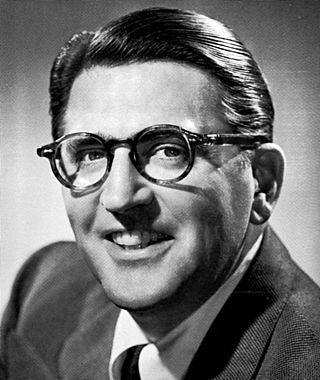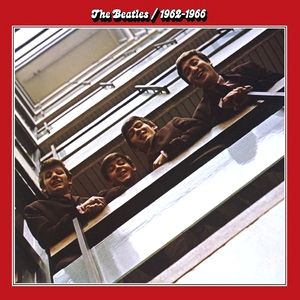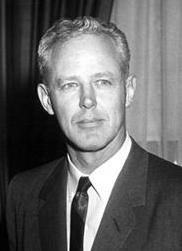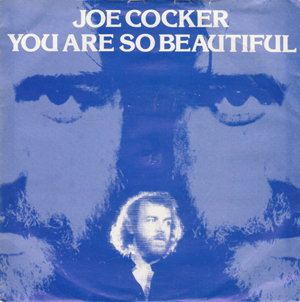Related Research Articles

The Music Man is a musical with book, music, and lyrics by Meredith Willson, based on a story by Willson and Franklin Lacey. The plot concerns con man Harold Hill, who poses as a boys' band organizer and leader and sells band instruments and uniforms to naïve Midwestern townsfolk, promising to train the members of the new band. Harold is no musician, however, and plans to skip town without giving any music lessons. Prim librarian and piano teacher Marian sees through him, but when Harold helps her younger brother overcome his lisp and social awkwardness, Marian begins to fall in love with him. He risks being caught to win her heart.

"Get Back" is a song recorded by the English rock band the Beatles and Billy Preston, written by Paul McCartney, and credited to the Lennon–McCartney partnership. It was originally released as a single on 11 April 1969 and credited to "The Beatles with Billy Preston". The song is one of the few examples of John Lennon featuring prominently as lead guitarist. The album version of this song contains a different mix that features a studio chat between Paul McCartney and John Lennon at the beginning, which lasts for 20 seconds before the song begins, also omitting the coda featured in the single version, and with a final dialogue taken from the Beatles' rooftop concert. This version became the closing track of Let It Be (1970), which was released just after the group split up. The single version was later issued on the compilation albums 1967–1970, 20 Greatest Hits, Past Masters, and 1.
Apple Records is a British record label founded by the Beatles in 1968 as a division of Apple Corps Ltd. It was initially intended as a creative outlet for the Beatles, both as a group and individually, plus a selection of other artists including Mary Hopkin, James Taylor, Badfinger and Billy Preston. In practice, the roster had become dominated by the mid-1970s with releases of the former Beatles as solo artists. Allen Klein managed the label from 1969 to 1973, then it was managed by Neil Aspinall on behalf of the Beatles and their heirs. Aspinall retired in 2007 and was replaced by Jeff Jones.

Worldwide, the British rock band the Beatles released 12 studio albums, 5 live albums, 51 compilation albums, 36 extended plays (EPs), 63 singles, 17 box sets, 22 video albums and 53 music videos. In their native United Kingdom, during their active existence as a band, they released 12 studio albums, 1 compilation album, 13 EPs, and 22 singles. The early albums and singles released from 1962 to March 1968 were originally on Parlophone, and their albums and singles from August 1968 to 1970 were on their subsidiary label Apple. Their output also includes vault items, remixed mash-ups and anniversary box-sets.

Robert Reiniger Meredith Willson was an American flautist, composer, conductor, musical arranger, bandleader, playwright, and writer. He is perhaps best known for writing the book, music, and lyrics for the 1957 hit Broadway musical The Music Man and "It's Beginning to Look a Lot Like Christmas" (1951). Willson wrote three other musicals, two of which appeared on Broadway, and composed symphonies and popular songs. He was twice nominated for Academy Awards for film scores.

Robert Preston Meservey was an American stage and film actor and singer. He is best known for originating the role of Professor Harold Hill in the 1957 musical The Music Man for which he received the Tony Award for Best Actor in a Musical. He reprised the role in the 1962 film adaptation, for which he received a Golden Globe Award for Best Actor – Motion Picture Musical or Comedy nomination.

The Church is an Australian rock band formed in Sydney in 1980. Initially associated with new wave, neo-psychedelia, and indie rock, their music later came to feature slower tempos and surreal soundscapes reminiscent of alternative rock, dream pop, and post-rock. Glenn A. Baker has written that "From the release of the 'She Never Said' single in November 1980, this unique Sydney-originated entity has purveyed a distinctive, ethereal, psychedelic-tinged sound which has alternatively found favour and disfavour in Australia." The Los Angeles Times has described the band's music as "dense, shimmering, exquisite guitar pop".

1962–1966, also known as the Red Album, is a compilation album of songs by the English rock band the Beatles, spanning the years indicated in the title. Released with its counterpart 1967–1970 in 1973, the double LP peaked at number 3 in the United Kingdom. In the United States, it topped the Cash Box albums chart and peaked at number 3 on the Billboard Top LPs & Tape chart while 1967–1970 reached the top spot. The album was re-released in September 1993 on compact disc, charting at number 3 in the UK.

"Oh! Darling" is a song by the English rock band the Beatles, appearing as the fourth song on their eleventh studio album Abbey Road (1969). It was written by Paul McCartney and credited to Lennon–McCartney. Its working title was "Oh! Darling ". Although not issued as a single in either the United Kingdom or the United States, a regional subsidiary of Capitol successfully edited it as a single in Central America, having "Maxwell's Silver Hammer" as its B-side. It was also issued as a single in Portugal. Apple Records released "Oh! Darling" in Japan with "Here Comes the Sun" in June 1970.

Goodnight Vienna is the fourth studio album by Ringo Starr. It was recorded in the summer of 1974 in Los Angeles, and released later that year. Goodnight Vienna followed the commercially successful predecessor Ringo, and Starr used many of the same players, including Billy Preston, Klaus Voormann, Robbie Robertson, Harry Nilsson, and producer Richard Perry. The title is a slang phrase meaning "it's all over".

Charles Burnham "Bud" Wilkinson was an American football player, coach, broadcaster, and politician. He served as the head football coach at the University of Oklahoma from 1947 to 1963, compiling a record of 145–29–4. His Oklahoma Sooners won three national championships and 14 conference titles. Between 1953 and 1957, Wilkinson's Oklahoma squads won 47 straight games, a record that still stands at the highest level of college football. After retiring from coaching following the 1963 season, Wilkinson entered into politics and, in 1965, became a broadcaster with ABC Sports. He returned to coaching in 1978, as head coach of the St. Louis Cardinals of the National Football League (NFL) for two seasons. Wilkinson was inducted into the College Football Hall of Fame as a coach in 1969.

"You Are So Beautiful" is a song credited to Billy Preston and Bruce Fisher that was first released in 1974 on Preston's ninth studio album, The Kids & Me. It was also the B-side of his single "Struttin'". Later that same year, English singer Joe Cocker released a slower version of the song on his album I Can Stand a Little Rain. Cocker's version was produced by Jim Price, and released as a single in November 1974. It became Cocker's highest-charting solo hit in the United States, peaking at number five on the Billboard Hot 100, and at number four on Canada's Top Singles chart.
"Happy Days Are Here Again" is a 1929 song with music by Milton Ager and lyrics by Jack Yellen. The song is a standard that has been interpreted by various artists. It appeared in the 1930 film Chasing Rainbows and was the campaign song for Franklin D. Roosevelt's 1932 presidential campaign. It is the unofficial anthem of Roosevelt's Democratic Party. The composition was renewed in 1956, so it will enter the American public domain on January 1, 2025. Sound recordings from 1929 will follow on January 1, 2030, under the provisions of the Music Modernization Act.

Encouraging Words is the fifth studio album by American soul musician Billy Preston, released in September 1970 on Apple Records. It was the last of Preston's two albums for the Beatles' Apple label, after which he moved to A&M Records. The album was co-produced by George Harrison and Preston. Harrison's songs "All Things Must Pass" and "My Sweet Lord" were issued here for the first time, two months before his own recordings appeared on his triple album All Things Must Pass.

The Music Man is a 1962 American musical film directed and produced by Morton DaCosta, based on Meredith Willson's 1957 Broadway musical of the same name, which DaCosta also directed. Robert Preston reprises the title role from the stage version, starring alongside Shirley Jones, Buddy Hackett, Hermione Gingold, Ronny Howard, and Paul Ford.
The Beatles experienced huge popularity on the British record charts in early 1963, but record companies in the United States did not immediately follow up with releases of their own, and the Beatles' commercial success in the US continued to be hampered by other obstacles, including issues with royalties and public derision toward the "Beatle haircut".

Doris Troy is an album released in 1970 on the Beatles' Apple Records label by American soul singer Doris Troy. It features songs written by Troy and a number of the participants on the sessions, including George Harrison, Stephen Stills, Klaus Voormann and Ringo Starr. Through the extended period of recording, the album became an all-star collaborative effort, typical of many Apple projects during 1968–70, although it was Troy's only album on the Beatles' label. Other guest musicians included Billy Preston, Peter Frampton, Leon Russell, Eric Clapton and members of the Delaney & Bonnie Friends band. Like the Harrison-produced single "Ain't That Cute", Doris Troy failed to chart in Britain or America on release.

Heartaches and Tears is a studio album by American country singer Jean Shepard. It was released by Capitol Records in March 1962 with a total of 12 tracks. The tracks mixed both new material and cover tunes. Among its new tracks was the single "How Long Does It Hurt ". It was the fourth studio album of her career and fifth overall. The album was met with positive reviews from publications.

"That's the Way God Planned It" is a song by American musician Billy Preston and the title track to his 1969 album of the same name. Issued as a single, the song was Preston's first release on the Beatles' Apple record label, following his guest role on the band's "Get Back" single. The lyrics to "That's the Way God Planned It" partly reflect the long musical apprenticeship Preston had served since childhood, mentored by artists such as Sam Cooke and Ray Charles, while musically the track combines the gospel tradition with rock. Produced by George Harrison in London, the recording also features contributions from Eric Clapton, Keith Richards, Ginger Baker and Doris Troy. Having been edited down to three minutes for its single release, the full version appeared on the album, as "That's the Way God Planned It ".

Wanda Jackson Sings Country Songs is a studio album by American recording artist Wanda Jackson. It was released in December 1965 via Capitol Records and contained 12 tracks. The album was Jackson's eighth studio record of her career and consisted of traditional country songs. Seven of these songs were released as singles between 1961 and 1965. Both "Slippin'" and "The Violet and the Rose" reached charting positions on the American country songs survey. The album received a positive review following its original release.
References
- 1 2 3 4 5 6 Riis, Richard (9 June 2014). "Apple's "Chicken Fat" Ad Harks Back to a Political Era Long Gone". Daily Kos . Retrieved 19 June 2014.
- 1 2 3 4 "The Federal Government Takes on Physical Fitness". John F. Kennedy Presidential Library and Museum. p. 2. Retrieved 19 June 2014.
- ↑ Yagoda, Ben (13 June 2014). "The Strange 1960s Gym-Class Anthem in Apple's New iPhone Commercial". Slate . Retrieved 23 June 2014.
- ↑ Tibken, Shara (4 June 2014). "Apple wants you to get rid of 'chicken fat' using its iPhone". CNET . Retrieved 23 June 2014.
- ↑ McCormick, Rick (5 June 2014). "New Apple ad urges you to shed that 'chicken fat'". The Verge . Retrieved 23 June 2014.
- ↑ "Poultry in Motion". Detroit Kid Show. Retrieved 3 July 2014.
- ↑ "Bernie Knee Bio". MTV. Archived from the original on July 15, 2014. Retrieved 3 July 2014.
- ↑ Elliott, Stuart (16 June 2014). "Q. and A. With Stuart Elliott". The New York Times . Retrieved 23 June 2014.
- ↑ Leeds, Sarene (2018-12-05). "The Marvelous Mrs. Maisel Recap: Land of Canoes and Knishes". Vulture. Retrieved 2020-03-25.